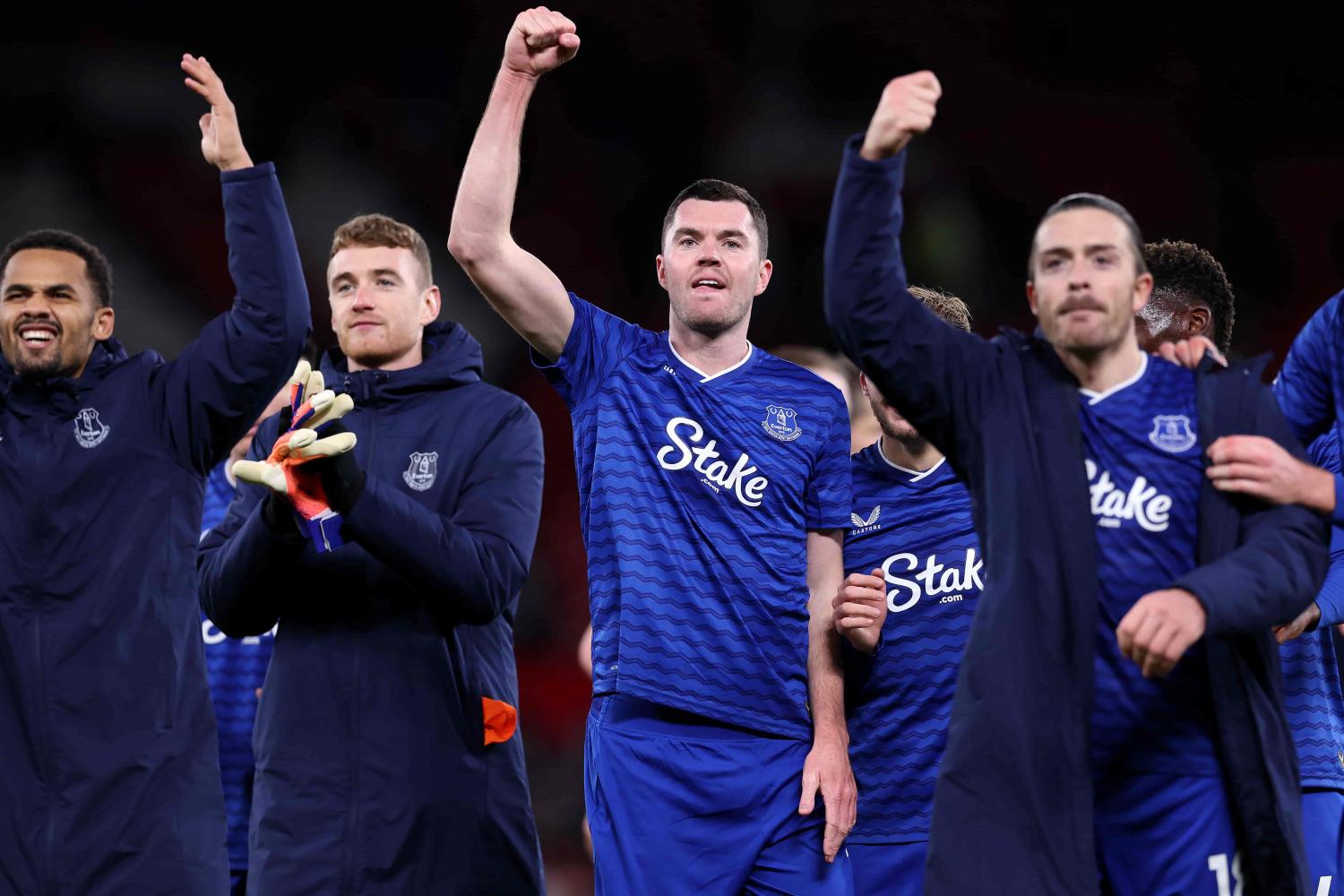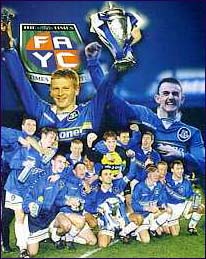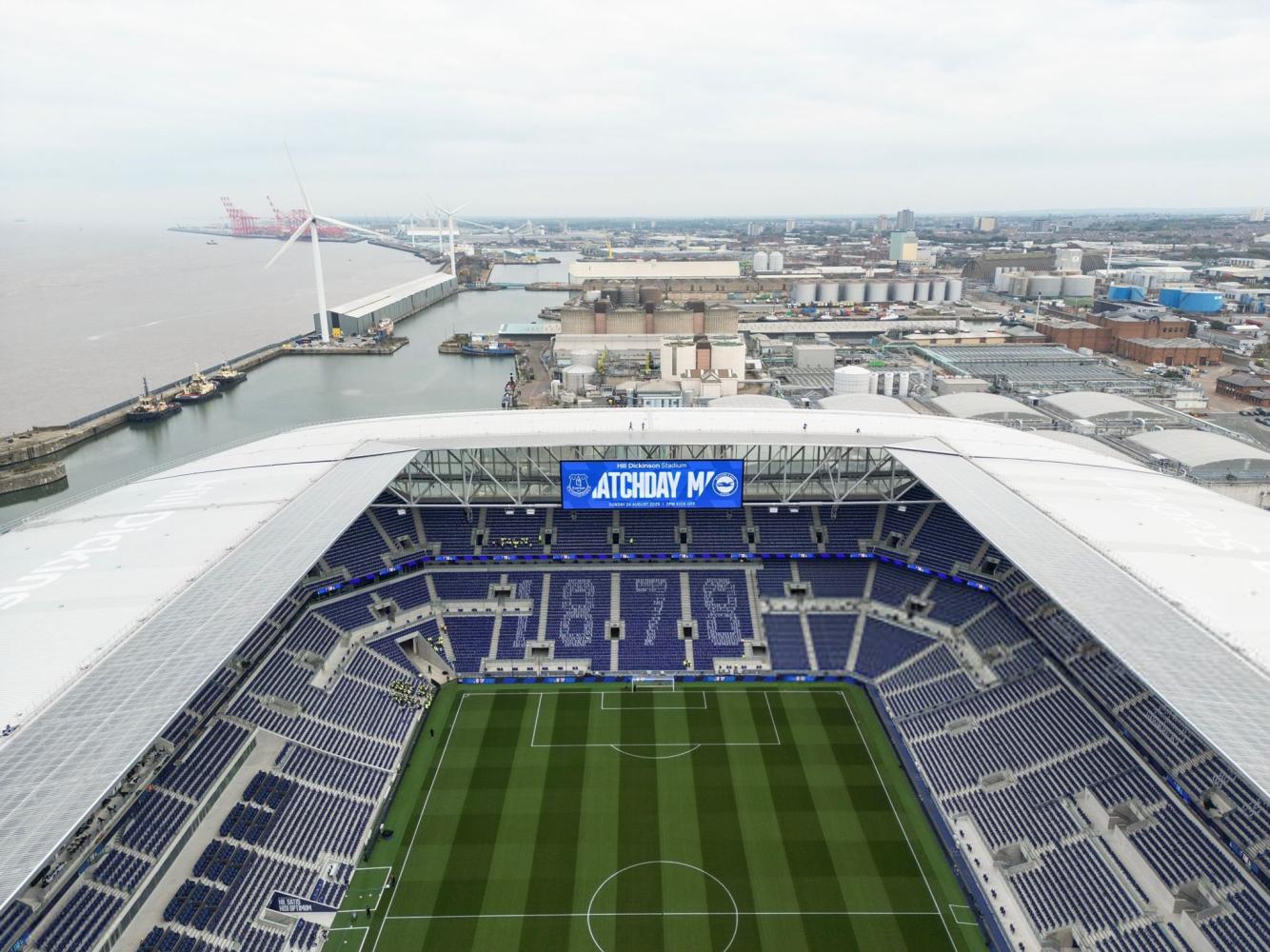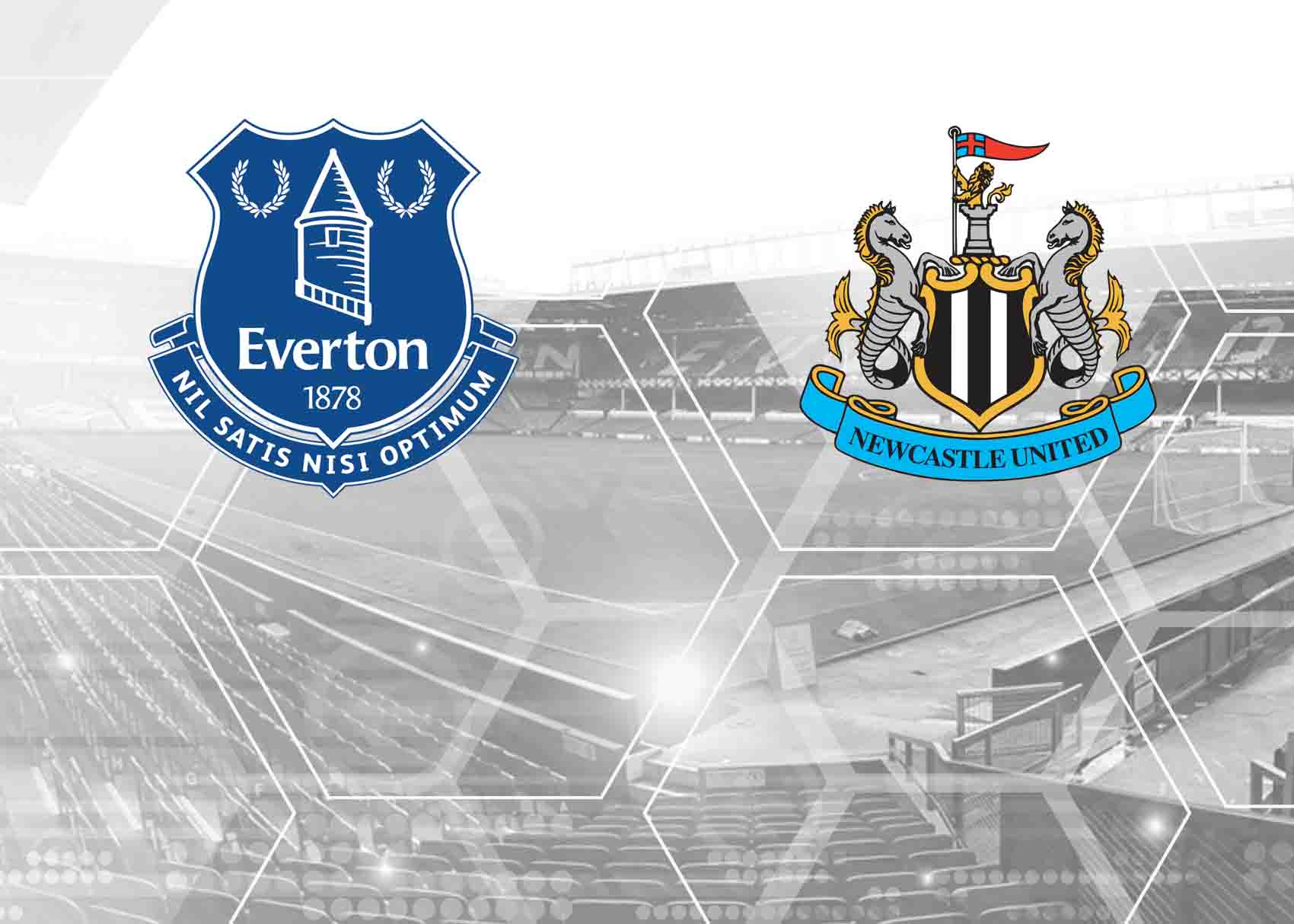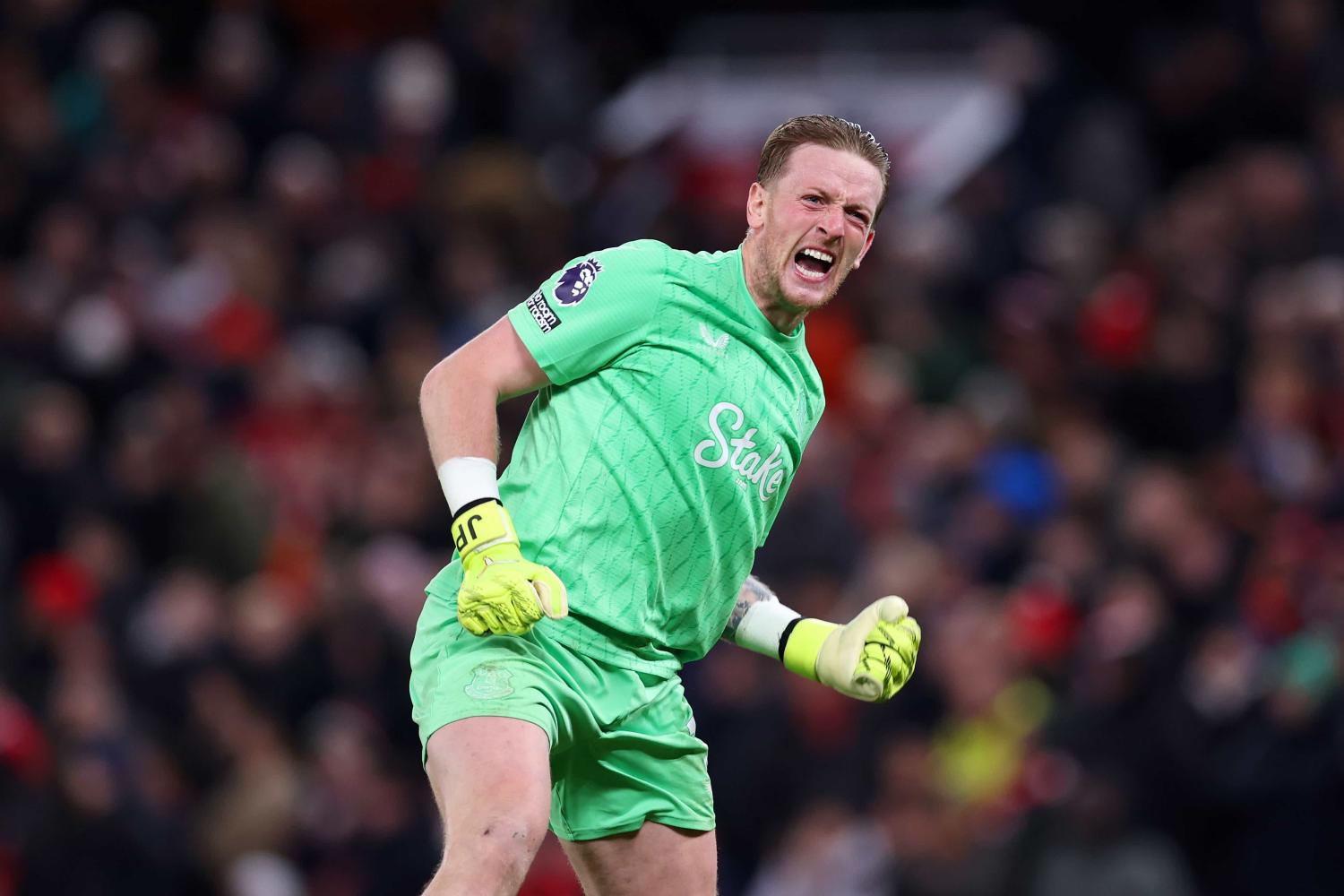IX: A ROYLE ERA (1994-1997)
 JOE ROYLE'S HOMECOMINGFollowing Walker's dismissal, the Everton Board reacted quickly and
named Joe Royle as the new manager. Royle, who had had 12 successful
years with Oldham, was a Goodison hero during the late sixties and early
seventies. November 12, 1994 will be marked as the turning point for
Everton, when the appointment of Joe Royle signaled a brief spiritual
reawakening for the beloved home club where Joe had become a star and big
favorite with the fans. Royle didn't make any immediate changes to the playing staff, although he brought Willie Donachie with him from Oldham as his assistant manager. Royle's new charges started very brightly with three consecutive wins: over Liverpool (2-0) and Leeds (3-0) at home and Chelsea (1-0) away. Everton kept a clean sheet for total of seven matches, a club record, although two of the matches had been played under Walker. The strong defensive performances required for such a record had resulted in a style of play which was considered uncharacteristic at The School of Science. Workmanlike displays by Horne, Ablett, Jackson, and Parkinson in defence were supported with only a little more class by Watson, and the excellent Unsworth. But Royle knew that a solid defence with enough bite to win back possession in hard but fair tackles would give his team the confidence they needed to move forward and score. In a typical moment of incisive wit, Royle mistakenly christened his boys the "Dogs of War", only to see the epithet misinterpreted by a mean-spirited press and by equally insensitive match officials. The playing style was not pretty, but it was effective. Everton were no longer a push-over but, as a result, there was little scope in such a team for flair players like Samways, Limpar, and Amokachi. It would be many months before he could find a first-team place for Daniel Amokachi, the Nigerian World Cup star, but Royle soon recognized the sporadic genius of the little Swede, Anders Limpar, who started to figure more and more in Everton's revival. BIG DUNCJoe Royle gave the Everton faithful a wonderful Christmas present in 1994, signing Duncan Ferguson from Rangers for �4.4M, a new club record. Big Dunc, who had suffered disciplinary problems in his native Scotland both on and off the field, had become an instant legend with the Goodison fans, who had adopted him as their idle during the few weeks that Ferguson had been on loan. Ferguson scored a memorable winner against Liverpool, and went on to score 8 goals in 16 games before suspension � for an unfair dismissal at Leicester � followed by a double hernia operation, kept him out until the last league game of the season at Coventry. A good run before Christmas saw Everton lift themselves out of the bottom four for the first time in the season. But Boxing Day provided a nasty reality check as Sheffield Wednesday found a way through Everton's improving defences. But the 4-1 home defeat proved to be just part of the new learning curve, as Joe Royle's influence was to result in just 6 loses over a total of 33 league and cup games. THE ROAD TO WEMBLEYEverton's FA Cup run, that would have such a great finish, started off in difficulties. A 1-0 victory over Derby at Goodison (Hinchcliffe the scorer) required a lot of work, as did perhaps Everton's luckiest win of the season, a 1-0 (Jackson) away victory over Bristol City. Both goals were scored by full-backs from outside the area. In January, Joe Royle finally ventured into the transfer market, bringing right back Earl Barrett to Goodison from Aston Villa for �1.7M. To Royle, Barrett was a known quantity, having served 3 years with him at Oldham. But to the fans, the cup-tied Barrett seemed a questionable addition, displacing Jackson from the league campaign, but not really settling or showing any outstanding qualities. Although the team had demonstrated an immense improvement on the field, they continued to languish on the edge of the relegation zone. Noteworthy performances against Crystal Palace (3-1) and Manchester Utd (1-0) rekindled thoughts of Fortress Goodison. But the away form continued to be disappointing, as narrow defeats at Newcastle and Leeds stopped Everton from rising any higher than 17th place in a crowded group that continued to be haunted by the prospect of relegation. With four dropping down to the Endsliegh Football League, the relegation battle threatened all 11 teams in the bottom half of the table. In the transfer market, Royle recouped Johnson's �1.7M on Barrett by selling the unpopular Burrows to Coventry, and the equally unpopular Angell to Sunderland. Shrewd decisions by Royle, although the Everton fans had been perhaps a little unkind in condemning both these players. Still "Nothing satisfies, but the best", and Joe Royle was on a mission to bring fame and fortune back to his beloved Everton. EVERTON FIRSTSOff the field, the influence of new Chairman, Peter Johnson, was leading to a number of changes and improvements at Goodison Park. Finally, it seemed that the true importance of the fans was being realized by the new men at the helm in Everton Football Club. A new Everton Shop was commissioned in Walton Road, with the distinctive Everton Tower featured as part of the architecture. The Evertonian Magazine had been published in December � a monthly tabloid magazine that was to prove very popular with the fans. Away matches were displayed on large-screen TV at Goodison, and in April, Radio Everton started broadcasting locally on match days. The Fifth Round of the FA Cup brought something that helped the fans to forget the league table for at least a while, a fine 5-0 victory over Norwich at Goodison. This set them up for a Sixth Round tie with Kevin Keegan's Newcastle Utd, also at Goodison. It took a weak header from skipper Dave Watson to win through to a semi-final encounter with cup favourites, Tottenham Hotspur. Meanwhile, it was back to the league, and a tough encounter with Blackburn Rovers at Goodison. Two goals down in six minutes to the demon pair of Sutton and Shearer, Everton fought back hard, and Stuart scored with a brilliant dipping shot over Flowers in the Blackburn goal. But the future Champions would not be beaten, although they hardly played the part, and were roundly booed off the pitch, along with their pliant referee. ALL ROADS LEAD TO LEEDSPre-match hype for the semi-final was heavily loaded against Everton, with many pundits predicting a "Dream Final" between Spurs and Manchester United. But Joe Royle, and the seething mass of Evertonians who packed out three sides of Elland Road had other ideas. The semi-final performance was heralded far and wide as the best since the heydays of the mid-eighties. An Everton team that had toiled so poorly under Mike Walker, now responded with spirit and commitment to the faith and inspiration of Joe Royle. In an almost unparalleled display of attacking zeal, Everton tore forward, with Anders Limpar leading the charge. Ironically, it was Walker's son, Ian, who had the daunting task of holding out the Blue shirts as they streamed toward his goal in an unrelenting sequence of attacks. Viscous corners from Andy Hinchcliffe were swung in with devilish accuracy, and after 30 minutes Matt Jackson clipped one in at the near post to give Everton a well-deserved lead. After half-time, Stuart made it 2-0, following up on a shot by Rideout, after Walker had gifted a poor clearance to the season's top scorer. Spurs pulled one back after the ref gave a dubious penalty award against Watson for an innocuous aerial challenge, and, when Rideout limped off, the nerves suddenly started jangling. But Daniel Amokachi, named as substitute, knew his time had come. He was on the field before anyone could stop him. After a few tentative touches from Amokachi, he found himself alone in front of goal, following an excellent break by Limpar and Stuart. His header from six yards gave Everton a 3-1 lead. But Amokachi hadn't finished. In another marvelous break by Limpar, Gary Ablett provided support on the left. It looked as if Limpar had over-hit the pass, but Ablett ran on into the penalty area and was at full stretch when he connected with the ball. A perfect pass was met by Amokachi at the far post, who rifled the ball into the roof of the net. The final score was 4-1. Spurs, who thought their name was on the Cup, had been totally outclassed. In the next match, a league game at home to Newcastle, Amokachi proved he still had the consummate skill and speed seen a year earlier for Nigeria in the World Cup. He scored two more goals, including a memorable strike on a long ball fed deep from Limpar. THE MERRY MONTH OF MAYAnd so to the finale of this amazing season, in the merry month of May. After a series of tense 0-0 draws against uninspiring opposition, punctuated by a 3-3 thriller at home to Chelsea, Joe Royle's team finally secured Premiership safety in the penultimate match of the season, away to already-relegated Ipswich Town. The goal came through a flurry of bodies, but Paul Rideout's effort had won only the third away victory of a tough campaign for battle-hardened Everton. So it was with happy hearts that Joe Royle's Blue Army of loyal fans descended on the Twin Towers of the famous Wembley Stadium for the 114th FA Cup Final. The stage was set for a tense and potentially dramatic encounter with Manchester United, whose season was in danger of falling apart completely after a series of disappointments. Failure in the European Cup, soured by the much publicised kung-fu kick of enigmatic French star Eric Cantona, had led them to lose their Championship Title the week before, after they failed to beat a tenacious West Ham. Double winners last year, United had to win the FA Cup if they were to have anything to show for the season. The final turned into a titanic battle of wills: the resolute strength
of Everton's defence against the midfield creativity of United. But
again it was Anders Limpar who would turn the match Everton's way, as
Unsworth and Watson neutralized the joint threat of Hughes and Ince.
It was Ince who lost the ball to Watson at the start of a flowing move in
which Limpar involved all three of his attacking companions (Jackson,
Stuart, and Rideout) as they broke away, 4 against 2. A perfect ball
forward to Jackson allowed him to check and then beat Bruce, before
crossing low and hard to Stuart on the far post. Stuart really should have scored, but his first-time strike crashed into the underside of the bar, with Schmeichel diving the wrong way, anticipating a low shot. The ball bounced down hard, and then rose toward Rideout, who launched himself to meet it perfectly as Irwin challenged... Paul headed the ball firmly into the top corner with Steve Bruce rooted to the line as the incredulous Schmeichel started his inevitable inquisition of their defensive inadequacies. Everton were in front! And they finished the first half stronger and brighter than a jaded United team facing another uphill struggle. Manchester United threw everything at Everton in the second half. But solid work from the entire defence, backed up by excellent saves from Southall, kept United at bay. Joe Royle, with an excellent sense of occasion, even sent on both Ferguson and Amokachi, to tremendous cheers. They acted as additional thorns in United's side, and both had opportunities to increase the scoreline. But at the final whistle, it was Everton 1 Manchester United 0. Everton had won the FA Cup for the fifth time in their history! Skipper, Dave Watson, was the happiest man in the world. He never stopped grinning from ear to ear as he lifted the Cup to the adulation of 40,000 Evertonians, and carried it all the way home to a rapturous reception for the team back on Merseyside. Joe Royle was the new messiah, having saved Everton from the shame and financial deprivation of the Endsliegh League. His inspiration, motivation, and vision had gelled the team in time to win the Cup against all the odds, and so to put Everton back into Europe. 1995-96: Heightened Expectations
Kanchelskis was to be a central part of the team-building effort that became strangely stalled as no other big names joined him. Worse, the transfer became bogged down by a wrangle between Manchester United and his previous club, Shator Donyst, as to who was to foot the �1.5M sell-on fee. As this nonsense dragged on, Kanchelskis was unable to make his debut and, perhaps significantly, could not be registered for the European Cup-Winners' Cup games. Everton's spirited cup-fighting history looked increasingly fragile as Milwall snatched a late equaliser in the League Cup second Leg at Goodison, going on to win 4-2 in extra time. This was the start of a depressing sequence of domestic cup losses to lowly competition that dogged Joe Royle's days in charge at Goodison Park. And the return to Europe after a decade of sadness ended in tears as Feynoord proved too resolute for Everton. Kanchelskis finally got to wear the No 17 shirt of Everton, and went on to become top scorer for the club with some stunning and vital trademark goals, including two in front of the Kop to beat Liverpool, and a hat-trick at Hillsborough in the 5-2 defeat of Sheffield Wednesday. While Kanchelskis was getting the headlines on the field, Duncan Ferguson became the first British Footballer to serve a prison sentence, at least in part as a result of an on-field incident (in Scotland back in 1994). Ferguson spent six weeks at Her Majesty's Pleasure in the infamous Barlinnie prison, where he received overwhelming support form Evertonians the world over. He also struggled with a nagging groin injury, only producing rare glimpses of the form needed to justify Royle's fulsome praise and a prediction that he could be a bigger legend (sic!) than William Ralph Dean. One of those magic moments was a swivel and shot that sent the ball hurtling into the net at Wimbledon for Everton's Goal for the Season. So, Royle's first full season in charge at Goodison Park ended in a very respectable 6th placing � just missing that coveted European place by a whisker. Ironically, this was yet another occasion when Everton suffered due to the offenses of others (shades of 1985?). Normally, 6th place would have meant a chance in Europe. But the Intertoto Cup nonsense created by Wimbledon, Sheffield Wednesday and Tottenham Hotspur the previous summer had led Uefa to penalise England one European place � that place should have been Everton's... As the season ended, Goodison Park said gooodbye to one of the most committed Evertonians in recent years: Barry Horne moved on to Birmingham City. In the summer, Everton participated in the Umbro Tournament, losing on penalties to Borussia Moenchengladbach, and drumming out a depressing goalless draw with Liverpool to share third place in a perhaps ill-concieved curtain-raiser. Still, it provided an opportunity for new signing Gary Speed to make all the right impressions. But Speed was the only new signing of any significance that Joe Royle produced. Few Evertonians realised at the time that Royle would go on to seriously neglect the business of squad-building in the appropriate manner. Everton were to pass yet another season without a striker capable of sticking away 25+ goals a season. Since Gary Lineker left for Barcelona in 1986, there have been Wayne Clarke and Tony Cottee plus the decline of Graeme Sharp and an embarrassing succession of knock-backs in the transfer hunt for strikers. From Saunders to Collymore, Brian Dean to Ravanelli, the depressing trend continues to haunt this great club. Worse still for the fans who idolosed him, the talismanic Daniel Amokachi was allowed to leave at the end of his 2-yr contract, just as he was winning a Olympic Gold Medal with Nigeria! Amo joined Besiktas in Turkey. 1996-97: A Season to Forget Gary Speed scored in the opening defeat of highly touted Newcastle United, and went on to have a solid season in which his consistency built slowly to become one of the few constants in a depressingly familiar story. After making a great start for all of 1� matches, things started to go awry. Some bright spots included the 7-1 drubbing of Southampton, when the team for once � all too rarely � clicked as a unit and played some wonderful flowing football. The high spot was reached at the end of November, with a 1-0 win at Derby � half of the only double Everton were to achieve � which put them in 6th place and above Manchester United. From that day on, the destinies of these two teams couldn't have been more opposite. From being tagged as title dark-horses, Everton went into a tailspin. The main problem was injuries to key players: Hinchcliffe, Grant, and Parkinson. But the tactics chosen, presumably by Joe Royle and Willie Donnachie, were hardly conducive to success or praise: too many long hoofs from the back, in the general direction of Duncan Ferguson, cut out the midfield and left new-boy, Nick Barmby, in the wilderness without a role. Six league defeats in a row, were followed by the now traditional early cup exit to lower-division opposition as Bradford City, inspired by Chris Waddle, beat Everton 3-2 at Goodison Park. This was to be the last game Andrei Kanchelskis played for Everton. He had not been "right in the head" according to Royle, and his on-field performances had been lacklustre, to say the least. The early-season rumours finally came true as Andrei moved to Fiorentina in Italy's Serie A for �8 million. Kanchelskis was not the only flair player to leave; earlier, Royle had finally sold Limpar and Samways, having made little or no use of their enigmatic skills as the season fell apart at the seams. This, along with the sale of Ebbrell and then Rideout, left the squad seriously depleted in view of the bulging injury list. The Dogs of War were finally muzzled. Royle was desperate to bring in new players, but only had Terry Phelan and the disappointing Claus Thomsen to show for his efforts. Worse, Royle had tried to deflect the inevitable criticism by in effect making Southall the scapegoat for the defensive blunders against Bradford. Paul Gerrard came in but did not impress, especially in a disastrous home match against Manchester United, when his goalkeeping errors gifted the future Champions two goals. Pressure was building as the deadline day for transfers beckoned towards the end of March. But big-name signings to rebuild the squad were promised by Joe Royle and Chairman Peter Johnson, and a double deal involving Norwegians Tor Andre Flo and Claus Efftevaag was heavily touted, as well as the return of Barry Horne. However, the Deadline Day shocker was not new signings at all, but the departure "by mutual consent" of the beleaguered manager, Joe Royle. It had been on the cards, but it came as a massive shock nevertheless. In the aftermath of confusion, it appeared that Johnson may have halted the transfer of make-weight Eftevaag, after Flo seemed to be given just one day to decide on his future, and understandably said he needed more time. Johnson may also have been unimpressed by Royle's attempt to bring back Barry Horne, albeit as reserve-team player-manager. But perhaps the most worrying and significant rumour � never confirmed officially � was that Joe Royle had struck a deal that would have taken cult hero Duncan Ferguson to Aston Villa for �9 million. Surely this cannot have been true, but it became an accepted rationale for Royle's sudden and necessary, if deeply saddening departure. A later explanation was that Royle had insisted on signing the make-weight, Eftevaag, without Flo. Johnson pout his foot down, and the end came rapidly. Either way, it looks like Joe Royle really did "lose the plot." So Royle's reign was ultimately all too brief. The FA Cup win became a distant memory, and Everton facing a relegation struggle for the fourth time in five seasons, but now without a manager. Dave Watson was appointed player-manager and immediately restored Neville Southall to the fluorescent pink goalie's jersey. In a desperately depleted squad, he put more faith in the youngsters than Joe Royle had, giving Michael Branch five full games in which he scored two vital goals, and bringing on Richard Dunne to strengthen the defence. But it was still touch and go down to the last week of the season before Everton were safe from the dread fear of relegation. As soon as the season was over, Joe Royle's departed influence ironically bore fruit with the signature of Slaven Bilic from West Ham. The deal was reputedly signed and sealed back in March, but Bilic felt he could not abandon the struggling Hammers and vowed to save them from relegation. Ironically, he left the Hammers to join a club with a better chance of winning trophies: but Everton finished three places below West Ham! Evertonians will always hold fond memories of Big Joe, owing him an enormous debt of gratitude not only for the FA Cup win but the escape from relegation in 1995, the blossoming of Andy Hinchcliffe and for bringing Kanchelskis' talents, albeit for only one full season. Everton would surely have gone down had the Silver Fox remained but Joe's Dogs of War saved the day. However, Joe Royle has to be held responsible for his failure to build on the relative successes of 1995 and 1996. There was no influx of talent after Euro '96; the whole thing became an enormous let-down and the depressing conclusion was that Joe Royle, a hero of Everton's past, did not have what was needed to manage a Premiership side in the 1990's.
|
| � Downward Spiral | Fear and Trepidation � |
| History | F I II III IV V VI VII VIII IX X B | A Royle Era |
Marko Poutiainen

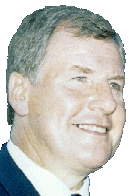
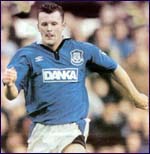
 The euphoria of an FA Cup victory in 1995 � only the fifth win for a
club that claims to be the greatest FA Cup performing team in the nation
� led to high expectations the following season, and all seemed to go
well as Joe Royle settled into his first full season at the helm.
Royle had scored a tremendous transfer coup in securing the transfer of
the mercurial Ukrainian right-winger, Andrei Kanchelskis from Manchester
United.
The euphoria of an FA Cup victory in 1995 � only the fifth win for a
club that claims to be the greatest FA Cup performing team in the nation
� led to high expectations the following season, and all seemed to go
well as Joe Royle settled into his first full season at the helm.
Royle had scored a tremendous transfer coup in securing the transfer of
the mercurial Ukrainian right-winger, Andrei Kanchelskis from Manchester
United.
